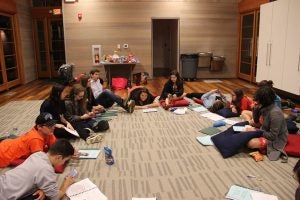Jewish Spring Retreat: Creating a Brave Space for Introspection
It all began with the realization that gushers—yes, the childhood-favorite treat—are Kosher. No one could believe it. Gushers? Really? Some might argue they are even more Jewish than Bernie, but thankfully, that’s not the thought experiment that enveloped the 12 of us on Jewish retreat last spring.
As soon as Shabbat descended we changed. All of us, some perhaps more than others, left some relic of the previous week’s stresses back on campus. The unconstructive thoughts that bog down our spirits and distort our perceptions of reality were burned. Literally. We wrote them down and threw them into the perfectly placed fireplace that kept us warm—and safe from these thoughts. Or so at least I thought.
 After disposing of my past week’s grievances I returned to my pillow on the floor to resume Friday night services. I felt calm and at peace within the familiar, quiet embrace of the Sabbath. I recited the traditional prayers on autopilot grateful to not be over-thinking for once. That feeling continued up until the rabbinic intern Norah shared a brief D’var Torah (an interpretation of the weekly Torah portion) and introduced the theme of the weekend: relationships—familial, platonic, and romantic. I chuckled to myself in an of-course-this-would-happen kind of way. What were the chances that what I had burned would be the subject of the entire retreat?
After disposing of my past week’s grievances I returned to my pillow on the floor to resume Friday night services. I felt calm and at peace within the familiar, quiet embrace of the Sabbath. I recited the traditional prayers on autopilot grateful to not be over-thinking for once. That feeling continued up until the rabbinic intern Norah shared a brief D’var Torah (an interpretation of the weekly Torah portion) and introduced the theme of the weekend: relationships—familial, platonic, and romantic. I chuckled to myself in an of-course-this-would-happen kind of way. What were the chances that what I had burned would be the subject of the entire retreat?
All of a sudden my safe space collapsed in on me and I found myself trapped within my mind’s darker corners. I stayed that way for a few harsh minutes until a friend’s interjection to the group reoriented me back to Shabbat. She suggested that rather than focus on creating a “safe space” for the retreat’s discussions to instead create a “brave space.” So we did.
With that new paradigm in tow, I began to experience the Jewish retreat differently. Yes, Shabbat serves to separate us from the pains and strains of the week, but a retreat itself is not an escape per se. It’s an opportunity to abstract oneself—physically, psychologically, and spiritually—and give oneself permission to grapple with the tough questions. It’s a retreat into oneself for the questions and one’s religion (or one’s community) for the answers.
Once back on campus Shabbat slowly but surely metamorphosed into a Monday grind. Yet the serenity did not leave me. Reality cannot strip me of the brave places I found within myself and for that I am thankful.
This article was written by Harper Weissburg, F’17